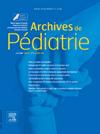Disordered eating behaviors and associated factors in children and adolescents with type 1 diabetes
IF 1.3
4区 医学
Q3 PEDIATRICS
引用次数: 0
Abstract
Object
As part of their treatment, patients with type 1 diabetes mellitus (DM) have to be very careful with what they eat and with their insulin doses. Therefore, the risk of eating disorders increases in this patient group. In this study, we aimed to determine the disordered eating behaviors of patients with type 1 DM and to evaluate the sociodemographic characteristics, diabetes care behaviors, and quality-of-life scale results that these behaviors may be related to.
Method
The sociodemographic characteristics and diabetes treatment data of 191 patients aged 9–18 years with type 1 DM were analyzed. The Pediatric Quality of Life Inventory (PedsQL), the PedsQL 3.0 Diabetes Module, and the Diabetes Eating Problem Survey-Revised (DEPS-R) were applied.
Results
The median DEPS-R score of the patients was 18 (19.00), and 44.5 % had a DEPS-R score above 20. A significant correlation was found between age, duration of diabetes, frequency of blood glucose measurement, hemoglobin A1c (HbA1c) level, body mass index standard deviation score (BMI-SDS), and DEPS-R score. There was no significant difference between girls and boys. Patients with a high DEPS-R score had low scores on the PedsQL and on the PedsQL 3.0 Diabetes Module.
Conclusion
The DEPS-R scale is a diabetes-specific, easy-to-use, and effective method for screening patients with type 1 DM for disordered eating behaviors. It can help prevent the progression of disordered eating behaviors to clinical eating disorders in patients with type 1 DM. It would be beneficial to use this scale as a routine screening, especially in clinics where access to a psychologist is not possible.
1 型糖尿病儿童和青少年的饮食紊乱行为及相关因素。
目的:作为治疗的一部分,1 型糖尿病(DM)患者必须非常注意饮食和胰岛素剂量。因此,这类患者出现饮食失调的风险也随之增加。本研究旨在确定 1 型糖尿病患者的饮食失调行为,并评估这些行为可能与之相关的社会人口学特征、糖尿病护理行为和生活质量量表结果:分析了 191 名 9-18 岁 1 型糖尿病患者的社会人口学特征和糖尿病治疗数据。应用儿科生活质量量表(PedsQL)、儿科生活质量量表 3.0 糖尿病模块和糖尿病饮食问题调查-修订版(DEPS-R):患者 DEPS-R 评分的中位数为 18 分(19.00),44.5% 的患者 DEPS-R 评分超过 20 分。年龄、糖尿病病程、血糖测量频率、血红蛋白 A1c(HbA1c)水平、体重指数标准偏差评分(BMI-SDS)与 DEPS-R 评分之间存在明显相关性。女孩和男孩之间没有明显差异。DEPS-R 得分高的患者在 PedsQL 和 PedsQL 3.0 糖尿病模块中的得分较低:DEPS-R量表是一种针对糖尿病、易于使用且有效的方法,可用于筛查1型糖尿病患者的饮食失调行为。它有助于防止 1 型糖尿病患者的饮食行为紊乱发展为临床饮食紊乱。将该量表作为常规筛查方法将大有裨益,尤其是在无法请到心理医生的诊所。
本文章由计算机程序翻译,如有差异,请以英文原文为准。
求助全文
约1分钟内获得全文
求助全文
来源期刊

Archives De Pediatrie
医学-小儿科
CiteScore
2.80
自引率
5.60%
发文量
106
审稿时长
24.1 weeks
期刊介绍:
Archives de Pédiatrie publishes in English original Research papers, Review articles, Short communications, Practice guidelines, Editorials and Letters in all fields relevant to pediatrics.
Eight issues of Archives de Pédiatrie are released annually, as well as supplementary and special editions to complete these regular issues.
All manuscripts submitted to the journal are subjected to peer review by international experts, and must:
Be written in excellent English, clear and easy to understand, precise and concise;
Bring new, interesting, valid information - and improve clinical care or guide future research;
Be solely the work of the author(s) stated;
Not have been previously published elsewhere and not be under consideration by another journal;
Be in accordance with the journal''s Guide for Authors'' instructions: manuscripts that fail to comply with these rules may be returned to the authors without being reviewed.
Under no circumstances does the journal guarantee publication before the editorial board makes its final decision.
Archives de Pédiatrie is the official publication of the French Society of Pediatrics.
 求助内容:
求助内容: 应助结果提醒方式:
应助结果提醒方式:


